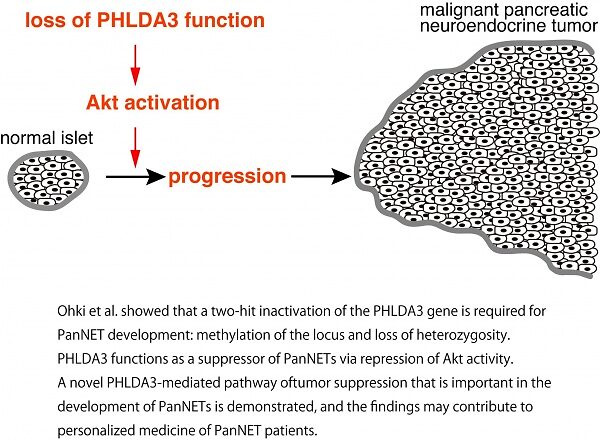Seminar "Elucidation of the molecular mechanisms of tumorigenesis by identification of novel cancer-associated genes-the PHLDA3 gene is a novel tumor suppressor gene of neuroendocrine tumors-"

Date
Location
Description
------------------------------------------
Date: Wednesday, April 8th, 2015
Time: 13:00 – 14:00
Venue: C016, Lab1
------------------------------------------
Speaker: Prof. Rieko Ohki
Division of Rare Cancer Research, National Cancer Center Research Institute
Title: Elucidation of the molecular mechanisms of tumorigenesis by identification of novel cancer-associated genes-the PHLDA3 gene is a novel tumor suppressor gene of neuroendocrine tumors-
Abstract: Both p53 and Akt are critical players regulating tumorigenesis with opposite effects. In addition, p53 and Akt negatively regulate each other to balance oncogenic and tumor suppressive signals within a cell. We previously reported a novel p53 target gene, PHLDA3, encoding a PH domain-only protein that represses Akt. We showed that PHLDA3 suppresses Akt translocation to the cellular membrane and subsequent phosphorylation/activation (Cell, 136, 535-550, 2009).
We report here that the genomic region of the PHLDA3 gene undergoes loss of heterozygosity (LOH) at a remarkably high frequency in human neuroendocrine tumors (NETs). The PHLDA3 locus undergoes methylation in addition to LOH, suggesting that a 2-hit inactivation of the PHLDA3 gene is required for NET development. We also demonstrate that PHLDA3 represses Akt activity and Akt-regulated biological processes in endocrine cells, and that PHLDA3-deficient mice develop abnormal in endocrine tissues. In addition, the tumor-suppressing pathway mediated by MEN1, a well-known suppressor of PanNETs, is dependent on the pathway mediated by PHLDA3, and inactivation of PHLDA3 and MEN1 cooperatively contribute to PanNET development. Novel PHLDA3-mediated pathway of tumor suppression that is important in the development of PanNETs is demonstrated, and the findings may contribute to personalized medicine of PanNET patients. (PNAS, 111, E2404-E2413, 2014).
References
- Rieko Ohki, Kozue Saito, Yu Chen, Tatsuya Kawase3, Yukie Aita, Nobuyoshi Hiraoka, Raira Saigawa, Maiko Minegishi, Goichi Yanai, Hiroko Shimizu, Shinichi Yachida, Naoaki Sakata, Akihiko Yokoyama, Ryuichiro Doi, Tomoo Kosuge, Kazuaki Shimada, Benjamin Tycko, Toshihiko Tsukada, Yae Kanai, Shoichiro Sumi, Hideo Namiki, Yoichi Taya, Tatsuhiro Shibata and Hitoshi Nakagama. PHLDA3 is a novel tumor suppressor of neuroendocrine tumors.
PNAS, 111 (23), E2404-E2413, 2014.
- Tatsuya Kawase, Rieko Ohki, Tatsuhiro Shibata, Shuichi Tsutsumi, Naoko Kamimura, Johji Inazawa, Tsutomu Ohta, Hitoshi Ichikawa, Hiroyuki Aburatani, Fumio Tashiro and Yoichi Taya. PH domain-only protein PHLDA3 is a p53-regulated repressor of Akt.
Cell, Vol. 136, pp. 535-550, 2009.
Rieko Ohki, Ph.D.
1997 Ph.D., Dept. of Biochemistry and Biophysics, Faculty of Sciences, University of Tokyo (Japan)
1997- 1999 Postdoctoral Research Fellow
Department of Immunology (Professor Tadatsugu Taniguchi), Graduate School of Medicine and Faculty of Medicine, University of Tokyo
1999 - 2002 Postdoctoral Research Fellow
Department of Life Science (Professor Fuyuki Ishikawa), Graduate School of Bioscience and Biotechnology, Tokyo Institute of Technology
2002 - 2011 Research Associate
Radiobiology Division (2002-2008), Growth Factor Division (2008-2010), Division of Cancer Biology (2010~2011), National Cancer Center Research Institute
2011 - present Group leader
Division of Refractory Cancer Research (2011-2014), Division of Rare Cancer Research(2014-), National Cancer Center Research Institute
Subscribe to the OIST Calendar: Right-click to download, then open in your calendar application.



